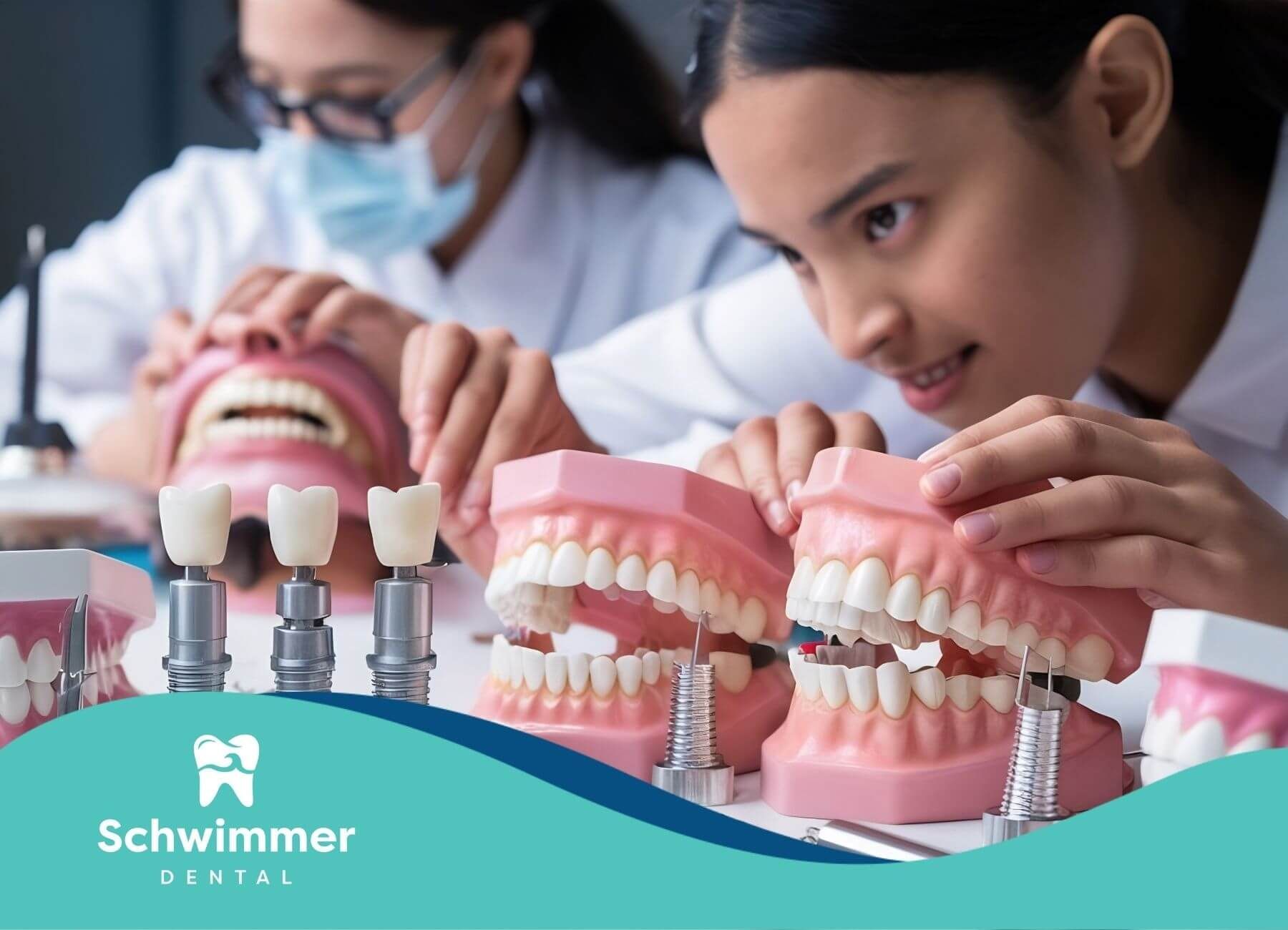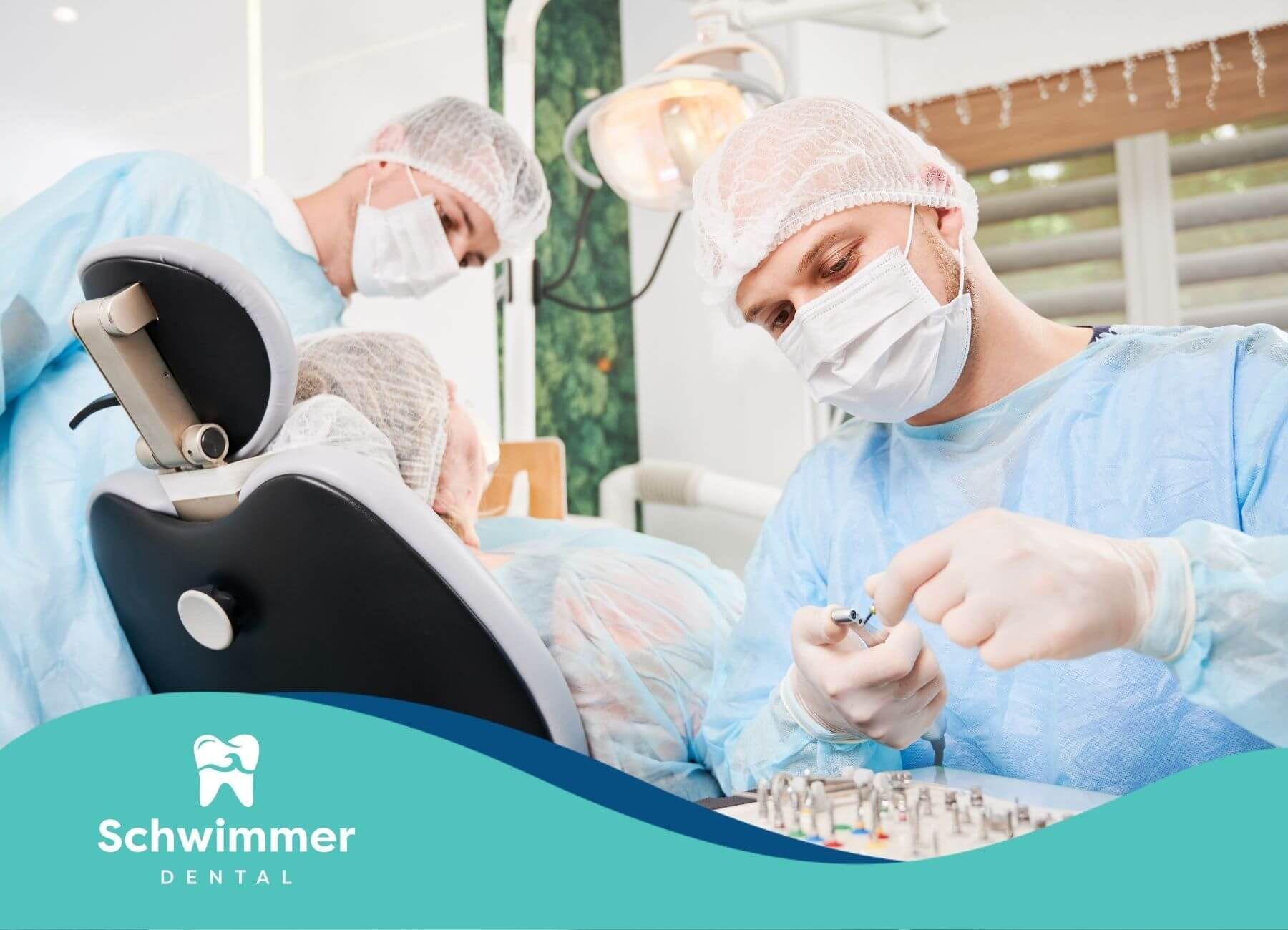Can Sleep Apnea Cause Dental Issues?
Sleep apnea is a serious and often underdiagnosed sleep disorder affecting millions of people worldwide. While many are aware of its impact on heart health, energy levels, and mental clarity, fewer people realize that sleep apnea can cause dental issues as well.
Dentists are often among the first to detect signs of sleep apnea during a routine exam. From tooth grinding to dry mouth and gum inflammation, the condition can leave a trail of clues in your mouth. This blog will walk you through the connection between sleep apnea and oral health, what signs to watch for, and how your dentist can help.
What Is Sleep Apnea?
Sleep apnea is a condition characterized by repeated interruptions in breathing during sleep. These pauses, called apneas, can last for several seconds and may occur dozens or even hundreds of times per night.
There are three main types:
- Obstructive Sleep Apnea (OSA): The most common form, caused by a physical blockage of the airway—usually when the soft tissue in the throat collapses.
- Central Sleep Apnea: Caused by a failure of the brain to signal the muscles to breathe.
- Complex (Mixed) Sleep Apnea: A combination of obstructive and central sleep apnea.
Obstructive Sleep Apnea is the type most commonly linked to dental health problems.
Common Symptoms of Sleep Apnea
Many people don’t realize they have sleep apnea until someone else points out their loud snoring or gasping during sleep. In addition to these telltale signs, symptoms may include:
- Excessive daytime sleepiness
- Morning headaches
- Dry mouth or sore throat upon waking
- Trouble concentrating
- Mood swings or depression
These symptoms often go unnoticed, but your mouth may be sending warning signs that your body isn’t getting the rest it needs.
Can Sleep Apnea Cause Dental Issues?
Yes—sleep apnea can absolutely lead to dental problems. In fact, dental issues are often one of the first signs of the condition. Let’s explore the main ways this sleep disorder affects your oral health.
1. Bruxism (Teeth Grinding)
One of the most common dental complications of sleep apnea is bruxism, or the grinding and clenching of teeth during sleep.
How It Happens:
The body often responds to an obstructed airway with micro-awakenings—brief periods of arousal from sleep. During these moments, you may involuntarily clench or grind your teeth as a response to airway restriction.
What It Leads To:
- Worn or flattened teeth
- Cracked or chipped enamel
- Tooth sensitivity
- Jaw pain or tightness (TMJ disorders)
- Headaches
Your dentist may notice signs of bruxism during an exam, especially if the enamel is wearing down faster than expected.
2. Dry Mouth (Xerostomia)
Dry mouth is a frequent complaint among people with sleep apnea, particularly those who breathe through their mouth during the night.
How It Happens:
When nasal passages are blocked due to apnea, the mouth often compensates by opening to facilitate airflow, leading to mouth breathing. This reduces the flow of saliva, which is essential for neutralizing acids and washing away bacteria.
What It Leads To:
- Bad breath (halitosis)
- Higher risk of tooth decay
- Gum irritation
- Difficulty swallowing or speaking
- Mouth sores
Saliva is crucial for maintaining a healthy oral environment. Its absence invites bacteria and acid to damage the enamel and soft tissues.
3. Gum Disease and Inflammation
Research shows a strong connection between sleep apnea and periodontal (gum) disease.
How It Happens:
Sleep apnea is linked to systemic inflammation and reduced immune function. When the gums are already under attack from bacteria due to poor sleep or dry mouth, your body's impaired response can worsen gum disease.
What It Leads To:
- Red, swollen, or bleeding gums
- Gum recession
- Loose teeth
- Bone loss around the teeth
Periodontitis, the most severe form of gum disease, is not only a dental issue—it’s a systemic condition that has been linked to heart disease and diabetes, both of which are also associated with sleep apnea.
4. Temporomandibular Joint Disorders (TMD/TMJ)
Many sleep apnea patients report jaw pain or discomfort, which is often caused by bruxism or imbalances in jaw positioning during sleep.
How It Happens:
Constant clenching and grinding stress the temporomandibular joints, which connect the jawbone to the skull.
What It Leads To:
- Clicking or popping sounds in the jaw
- Jaw stiffness or locking
- Facial pain
- Headaches and neck tension
TMJ disorders can affect your ability to chew, speak, and sleep comfortably.
5. Tooth Wear and Erosion
Chronic grinding and acid exposure from dry mouth can cause premature tooth wear and enamel erosion.
Visible Signs:
- Shortened teeth
- Flattened or pitted chewing surfaces
- Translucent edges on the front teeth
- Increased sensitivity to hot, cold, or sweet foods
Once enamel is worn away, it does not regenerate—making early detection and intervention essential.
How Dentists Can Spot Sleep Apnea
Your dentist may be one of the first healthcare providers to suspect sleep apnea based on your oral health. During routine checkups, they may observe:
- Excessive tooth wear
- Scalloped tongue (caused by pressing the tongue against teeth during airway obstruction)
- Jaw pain or tightness
- Signs of bruxism
- Dry mouth symptoms
Some dentists are trained to screen for sleep disorders and may refer you to a sleep specialist for further evaluation.
Dental Treatments for Sleep Apnea
While a Continuous Positive Airway Pressure (CPAP) machine is the gold standard treatment for moderate to severe sleep apnea, dental appliances can offer relief, particularly for those with mild to moderate OSA or those who can’t tolerate a CPAP machine.
Common Dental Solutions:
1. Oral Appliance Therapy (OAT)
Custom-made devices worn during sleep that reposition the lower jaw or tongue to keep the airway open.
Benefits:
- Comfortable and easy to wear
- Portable
- Silent (unlike CPAP)
- Non-invasive
2. Night Guards for Bruxism
Custom-fitted mouthguards protect the teeth from grinding and relieve jaw pressure.
3. Orthodontic Treatment
In some cases, orthodontic solutions like expanding the palate or realigning the bite may help improve airflow.
Tips for Protecting Your Oral Health If You Have Sleep Apnea
Even if you’re already undergoing treatment for sleep apnea, you’ll want to take additional steps to protect your teeth and gums.
1. Maintain Excellent Oral Hygiene
Brush twice daily with fluoride toothpaste and floss once a day to keep bacteria under control.
2. Stay Hydrated
Drinking water throughout the day helps keep your mouth moist and flush away bacteria.
3. Use a Humidifier
Especially helpful for CPAP users, a humidifier adds moisture to the air and can reduce dry mouth.
4. Avoid Alcohol and Tobacco
Both can worsen sleep apnea symptoms and dry mouth.
5. Visit Your Dentist Regularly
Routine checkups can catch dental issues early and help manage bruxism, dry mouth, or gum disease related to sleep apnea.
Why You Shouldn’t Ignore the Connection
If left untreated, sleep apnea doesn’t just rob you of a good night’s rest—it puts your oral health and overall well-being at serious risk.
Many patients are unaware of the connection between their dental symptoms and sleep problems until a dentist brings it up. Addressing the root cause can prevent long-term damage, save your teeth, and potentially improve your sleep quality.
Final Thoughts
The mouth often tells a story that the rest of the body hides—and in the case of sleep apnea, it can be a crucial clue to a bigger issue. Bruxism, dry mouth, gum disease, and tooth wear are all common indicators of undiagnosed sleep apnea.
Fortunately, with early intervention and the right support, these dental complications can be managed effectively. If you’re noticing changes in your oral health or suspect that sleep issues may be contributing to dental problems, consult a knowledgeable dentist.
At Schwimmer Dental, we understand the link between sleep apnea and dental health. Our team is equipped to recognize warning signs, offer protective treatments, and collaborate with sleep specialists to help you rest easy—without compromising your smile.
Frequently Asked Questions
Can my dentist diagnose sleep apnea?
Dentists can’t officially diagnose sleep apnea, but they can identify signs and symptoms and refer you to a sleep specialist for a proper diagnosis.
Will treating sleep apnea improve my dental health?
Yes. Effective treatment (like CPAP or oral appliances) can reduce bruxism, improve dry mouth, and slow down gum disease progression.
Are dental devices as effective as CPAP?
Oral appliances can be very effective for mild to moderate cases of obstructive sleep apnea. Your dentist and sleep doctor can help determine which treatment is best for you.
Sources:
- https://www.mayoclinic.org/diseases-conditions/sleep-apnea/symptoms-causes/syc-20377631
- https://www.ncbi.nlm.nih.gov/books/NBK459252/
- https://www.hopkinsmedicine.org/health/conditions-and-diseases/bruxism
- https://oralcancerfoundation.org/complications/xerostomia/
- https://pmc.ncbi.nlm.nih.gov/articles/PMC4507718/



